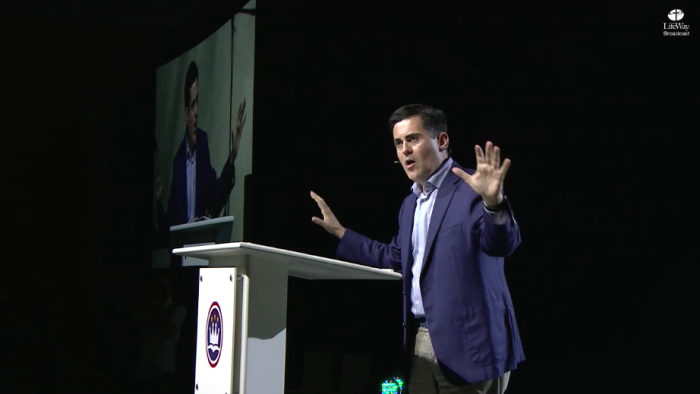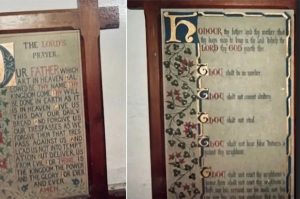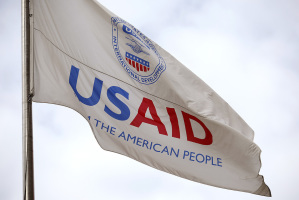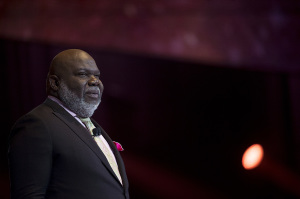Russell Moore withheld concerns in leaked letter to 'shake' trust at SBC annual meeting: trustee

A trustee of the policy wing of the Southern Baptist Convention asserts that its former president, Russell Moore, intentionally withheld information from trustees about his disagreements with leaders of the SBC Executive Committee over the handling of sexual abuse cases to undermine trust at the denomination's annual meeting.
In a 12-page letter dated Sept. 17, Jonathan Whitehead, an attorney and trustee of the Ethics & Religious Liberty Commission, said that leaked letters written by former ERLC President Moore to members of ERLC's Executive Committee were leaked to the media before concerns were shared with the full ERLC board of trustees.
The trustee's letter was sent to SBC Executive Committee Chair Ronnie Floyd, SBC Sexual Abuse Task Force Chair Bruce Frank and Julie Myers Wood, an attorney with the third-party firm hired to investigate the SBC’s handling of sexual abuse claims. Whitehead claimed the Moore letters were leaked with ulterior motives.
Whitehead believes these letters were used to create a narrative in the press rather than alert the full board of trustees about the problems related to handling sexual abuse cases and other issues. They were, he said, an act of "blatant deception."
Moore's February 2020 letter, which was published in May by Religion News Service just weeks ahead of the SBC's 2021 annual meeting, spoke of how the SBC Executive Committee wanted him to live in "psychological terror" and that he and his family had endured horrible treatment by denominational leaders.
Another letter leaked to the media was written by Moore to then-SBC President J.D. Greear on May 31, alleging that SBC leaders mishandled a "crisis of sexual abuse."
The purpose of leaking the Moore letters was "to shake messenger trust and confidence at an SBC annual meeting," Whitehead wrote in the Sept. 17 letter.
"The leak avoided disclosure to fiduciaries and a dispassionate investigation because the goal was to deprive the Convention of confidence in its entire fiduciary system. Efforts to use [sex abuse] survivors' concerns as means to Baptist political ends and power should be investigated by the Task Force, exposed by the messengers, and rejected in the strongest possible terms," he added.
"If deception can be used to push Messengers to create a polity crisis at a single annual meeting, the Convention will see repeated 'June 1 Surprises,' trying to deprive messengers of confidence in their institutions in pursuit of some goal or another. The Convention may not long survive."
In a Tuesday phone interview with The Christian Post, Whitehead emphasized that Baptists can't sit by quietly when severe allegations, particularly those regarding sexual abuse, rank bigotry and molestation, are occurring in ministries.
"What we had is a February 2020 letter from Russell Moore to the Executive Committee of the Ethics and Religious Liberty Commission — that should be about five folks — and they should have received this letter," he said.
"The letter makes claims about a behind-the-scenes group that is angry about or was trying to cover up child molestation and bigotry."
Moore added in the February 2020 letter that he was hearing himself scream at night and that he could not live with the screams any longer.
"The question for me is: what happened next? Because as a trustee of the ERLC, in September 2020, I was asking some pretty detailed questions about how we were relating to the Southern Baptist Convention Executive Committee," Whitehead told CP.
"The letter describes some really horrific things going on behind the scenes in Southern Baptist life in February 2020 and the trustees of the ERLC were not told about that."
Only the five members of the ERLC Executive Committee were informed, he explained.
CP reached out to Moore for comment on the issues raised in the Whitehead letter. A response was not received by press time.
CP also reached out to David E. Prince, a professor of preaching at The Southern Baptist Theological Seminary who chairs the ERLC board of trustees. A response was not received by press time.
Whitehead does not know which one of the trustees leaked the letter. All have denied doing so, he told CP.
As opposing sides of this particular conflict voiced their opinions on social media, it emerged last week that Whitehead wasn't the only trustee who didn't see the Moore letter.
In a tweet replying to Justin Sampler, an SBC pastor in Oklahoma and ERLC trustee, ERLC trustee Robert Orleck claimed that he did not see Moore's February 2020 letter until it was made public.
Whitehead said the answer he received to his detailed September 2020 questions about the ERLC's relationship with the SBC Executive Committee was: "It is fine. There are a few disgruntled people but we will handle them. It's not a big deal. Our relationship with Ronnie Floyd and the Southern Baptist Convention Executive Committee is good."
But in May 2021, Moore's letter speaking about the culture of covering up abuse was publicized weeks before the denomination's annual meeting. It became apparent that the relationship between Moore and the SBC Executive Committee leaders was strained.
Moore said in the letter that he could not and would not be asked to keep quiet any longer about what he saw as a toxic culture. However, the matter was kept quiet from the ERLC trustees who are supposed to know what is going on, how it affects the organization's mission and its ability to do its work, Whitehead continued.
"The question is: Why was it kept secret?" Whitehead asked. "I've asked the members of the [ERLC] Executive Committee when you got this letter and why weren't we told about it?"
The response Whitehead received was that Moore "got over it" and that his February 2020 letter was written "in the heat of the moment."
An ERLC Executive Committee member wrote to Whitehead and informed him that Moore "simply got back to work" soon after that.
"But if it was written in the heat of the moment and it was not reliable that might be a reason to 'get over it.' But with the claims that were in this letter, there can be no 'getting over it,'" Whitehead argues.
"Baptists cannot get over credible claims of covering up sexual abuse and bigotry and molestation amongst our Cooperative work," he added. "If people sit on credible allegations, it allows the poison to affect our work. We can't root out poison that we don't know about."
Whitehead reiterated: "The question for me is why did five Baptist trustees and Dr. Russell Moore keep them quiet from board members that could have helped him respond?"
"The only real conclusion that I can come to is that they agreed, or in some sense expected the whole Convention would hear about this before the [annual meeting] in an attempt to say, in essence, 'Baptists, you can't trust our trustees. We don't have any confidence in the trustees and so we're going to have to throw this out and blow up a convention to get action.'"
Whitehead maintains Baptist trustees would have and should have acted, but the information was kept from them.
"If you're blowing the whistle to the right authorities, then an investigation could have filled in the names," Whitehead said. "The question is, why didn't they blow the whistle to the ERLC and its trustees earlier? Why was it hidden?"
He contends that "if Baptists are supposed to trust their trustees to act, then what was shown here was that the facts were hidden so they couldn't act."
"And that's the problem that we need to grapple with here," Whitehead said.
The emergence of Whitehead's letter came amid a spirited debate in the SBC Executive Committee over how to best oversee an investigation into the panel's handling of sexual abuse reports over the last two decades.
Last Tuesday, the committee voted to allow Guidepost Solutions, the firm investigating the committee's handling of sexual abuse claims within SBC churches, to review privileged communications between committee members and their lawyers as requested by messengers and the Sexual Abuse Task Force
Sexual abuse survivor advocates insisted waiving attorney-client privilege was necessary to conduct a thorough review. Those opposed to scrapping attorney-client privilege said the move effectively diminishes their fiduciary duties. The final vote tally was 44-31 to waive privilege.
Thus far, eight members of the 86-member Executive Committee resigned, according to The Alabama Baptist, the news service of the Alabama Baptist Convention. More are reportedly considering their own resignations.
"We were put in a very difficult situation," said Philip Robertson, pastor of Philadelphia Baptist Church in Louisiana, in an interview Friday with the Baptist Message.
"We were in this tension between abiding by the will of the messengers while also protecting, potentially, the viability of not only the Executive Committee but the entire Southern Baptist Convention."
Robertson elaborated that those who voted "no" to waiving attorney-client privilege "did not do so to protect anyone or to hinder in any way the uncovering of any alleged wrongdoing."
"Every member of the EC welcomed the investigation. This was clearly demonstrated when the overwhelming majority of the committee voted to allocate $1.6 million to fund the investigation."
When asked where things presently stand as far as denominational trust is concerned, Whitehead told CP he assumes that there will soon be a report to the SBC that describes how the denomination has responded to sex abuse claims.
"What Baptists need to be watching for is whose interests are advanced. Will that be new political leadership? Are their interests advanced? Or are the interests of victims advanced?" he asked. "Because there are certainly some obvious things that Baptists can do to respond and compensate real victims of abuse. They need our help and compassion and our compensation in some sense."
"So who benefits from these reports? Is it going to be victims? Or will it be SBC politicians?" he continued. "That will tell us a lot about the direction of the Convention."





























